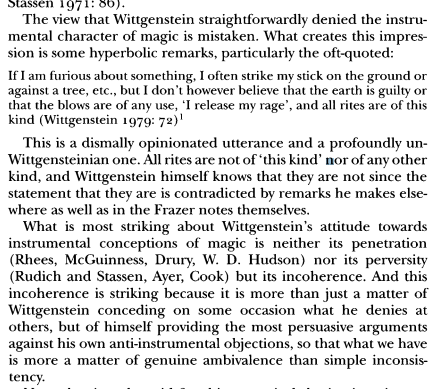It is easy to imagine a language consisting only of orders and reports in battle. -- Or a language consisting only of questions and expressions for answering Yes and No -- and countless other things.— And to imagine a language means to imagine a form of life.It is easy to imagine countless forms of life? To imagine a life in which people only talk when giving orders and reports in battle? Do they fight all the time? Is that easy to imagine?
Why is Wittgenstein telling us that this is easy to do?
Surely the careful reader will remember §19 upon reaching §25, which tells us that:
Giving orders, asking questions, telling stories, having a chat, are as much a part of our natural history as walking, eating, drinking, playing.This is contrasted with the most primitive forms of language, which even animals might have. The implication seems to be that the builders are not (really, fully) human. So then how easy can it be to imagine their form of life?
Then of course there is the shopkeeper of §1. He comes to mind when reading §53, which reads in part:
(We don't usually carry out the order “Bring me a red flower” by looking up the colour red in a colour chart and then bringing a flower of the colour that we find in the chart;...)Presumably Wittgenstein is aware, then, that his shopkeeper is unusual. How unusual is he? As strange as the builders? Wittgenstein does say in §1 that "It is in this and similar ways that one operates with words," but could this be part of what we are asked in this paragraph to imagine? That is, it might not be a claim that Wittgenstein makes. Rather, as with the builders, it might be something that he asks or tells us to imagine, without claiming that the example is realistic. Apart from what he says in §19, that is.
So back to §19 and what it says about the builders. Can we imagine the language and form of life of A and B? We can picture it. Wittgenstein describes their language, and we could make a cartoon, say, in which they build all day, eat in silence, and then go to sleep. In that sense we can imagine such a form of life. Does it seem oddly inhuman though? Yes it does. In that sense we cannot imagine human beings living like this for long, as a way of life. So can we really imagine such a life or not? Paraphrasing PI 47 we might say: That depends on what you understand by 'imagine.' And that, of course, is not an answer to, but a rejection of, the question.
It also depends on what you count as a language, or as a form of life. And I don't think that's just a matter of defining form of life as a technical term. It depends on what we count as life or as living.
In the section of Inheritance and Originality on the builders, Stephen Mulhall calls the words of the PI "treacherous from the very beginning" (p. 52). He notes that Baker and Hacker have pointed out problems with the content of the builders' language, such as its lack of syntax, which we might normally expect to be a feature of any language. And Rhees sees problems with the context of this 'language': it does not connect with other recognizably human concerns, such as most of the ones mentioned in §25. So is it or is it not really a language? It seems to me that we can say what we like, as long as we face the facts. But what that means is not really clear. Is it facing the facts to add all sorts of details to Wittgenstein's picture, providing a background or adding flesh to the skeleton he provides? Or is that a refusal to accept the facts as given, like wondering about irrelevant details of Hamlet's family tree as if they must exist? Is it realistic to make a cartoon more lifelike or, on the contrary, to accept it as a cartoon? It depends on our purpose, surely. The builders' language is introduced in connection with Augustine's account of how he learned language, but the builders' language, bound up with construction, is quite different from anything Augustine describes.
On pp. 56-57 Mulhall goes through three Cavellian ways of taking the primitiveness of the builders: they are something like Neanderthals, primitive beings; they might be quite sophisticated but their language is primitive; or they are an allegory of modern life. I'm simplifying, but that's roughly it. If we choose one of these options, though, then we are settling a matter that is not, in itself, settled. We are imposing our own ideas. Mulhall writes that, "If we accept for a moment that it is an essential part of Wittgenstein's challenge to us as readers to fill in the unspecified wider context of the builders' lives, then ..." but why should we accept this, even for a moment? Why not leave the unspecified unspecified? If we insist on specifying certain details, or insist that without them we are not really imagining a language (or not really imagining a language, or a form of life) then we haven't thereby discovered anything about anything but ourselves, about what we are prepared to accept as imagining or as language or as life.
The contrast with animals is relevant here, too, I think. Do animal forms of communication count as language? That is up to us, at least in part. The essence of language is expressed by grammar, and we have a say in what that means.
I think I'm largely, but perhaps not exactly, agreeing with Mulhall here. And there is more to read and think about on all this. But I'll leave it here for now.








